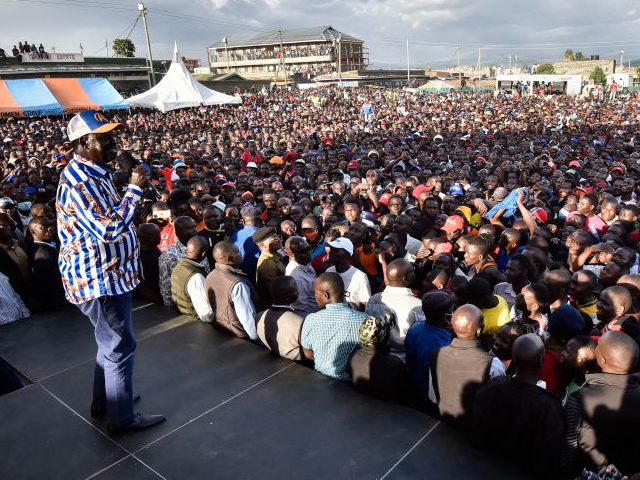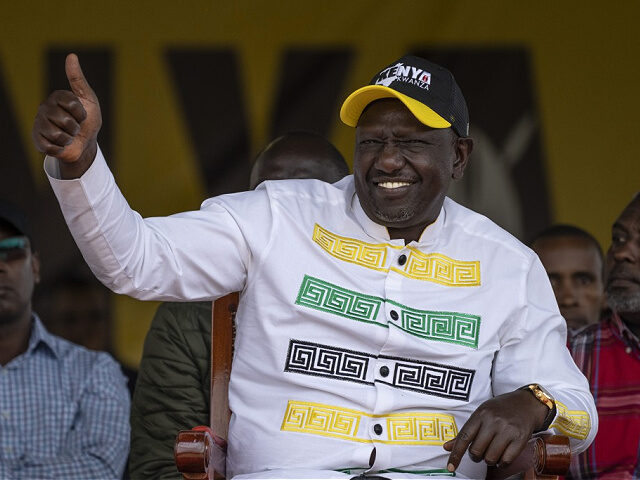Early vote tallies in Kenya on Wednesday appeared to show a small lead for current Deputy President William Ruto, an outspoken critic of China’s growing influence in the country.
It was not clear as of Wednesday afternoon if Ruto would be able to climb past the “50% plus one vote” threshold needed to claim victory against opposition leader Raila Odinga.
Kenyan elections have a distressing tendency to end with violence and allegations of fraud, but observers are hopeful Ruto and Odinga can settle their race peacefully. One incident of major violence has been reported so far, a factional battle in the town of Eldas that closed the polls on Tuesday. Local officials said polling stations reopened on Wednesday without incident.
Another incident reported on voting day involved a member of parliament who shot a rival’s bodyguard outside a polling station, but electoral commission chief Wafula Chebukati shrugged this off as a routine “murder case” that had no significant impact on voting.
According to Kenya’s Independent Electoral and Boundaries Commission (IEBC), results have been received from 99 percent of Kenya’s polling stations but a rule implemented after the last turbulent election requires regional tallies to be physically transported to the capital of Nairobi for verification, so the winner of the race is still unclear.
Local media reported convincing wins for Ruto at several village polling stations, including some surprise wins in townships where other candidates were thought to have banked comfortable leads.

Azimio coalition party’s Raila Odinga speaks to supporters on a stage during his rally after being officially nominated as a Presidential candidate by Independent Electoral and Boundaries Commission (IEBC) in Nakuru on June 5, 2022, ahead of next August’s presidential elections in Kenya. (Photo by SULEIMAN MBATIAH/AFP via Getty Images)
One of the big surprises came at the primary school polling center where Odinga cast his own ballot. He had planned to lead a triumphant parade of supporters to the voting booth, but only about half of them showed up.
Ruto also won by a wide margin at the polling station where current President Uhuru Kenyatta cast his vote. Kenyatta is supporting his former adversary Odinga after a more recent and severe falling-out with Ruto.
Kenya’s Daily Nation noted that different media outlets are reporting different totals in the close presidential race because each “media house” is conducting its own tally using data from the electoral commission. Some of the media houses are counting votes more slowly, while others may have missed a few of the random data uploads from the commission. The commission technically has one full week to report the final results.
According to the closely-watched National Media Group tally, Ruto led on Wednesday morning with 51.44 percent against Odinga’s 47.91 percent. Some other media groups claim Odinga leads by a point or so, floating just barely above the 50 percent threshold.
Ruto made a big pitch to younger voters, touting his own humble origins as a hard-working “chicken hustler” whose focus will be on increasing job opportunities. He might be further ahead if the youth vote was not so apathetic. Turnout among disillusioned young Kenyans is reportedly low, although they have been showing up at rallies to collect the small cash incentives offered by candidates to make their events look more popular. Kenya’s interior minister said in July that bribes for voters are so popular this year that banks ran short of small-denomination shilling notes.
It has been 20 years since the loser accepted the results of a Kenyan election, so the current contest is seen as a test of stability. It could also mark a new stage in Kenya’s relationship with China, if Ruto wins and keeps his campaign promises to reveal the details of long-secretive government deals with Chinese companies. Ruto also pledged to deport Chinese nationals working illegally in Kenya, freeing up more jobs for locals.

COMMENTS
Please let us know if you're having issues with commenting.